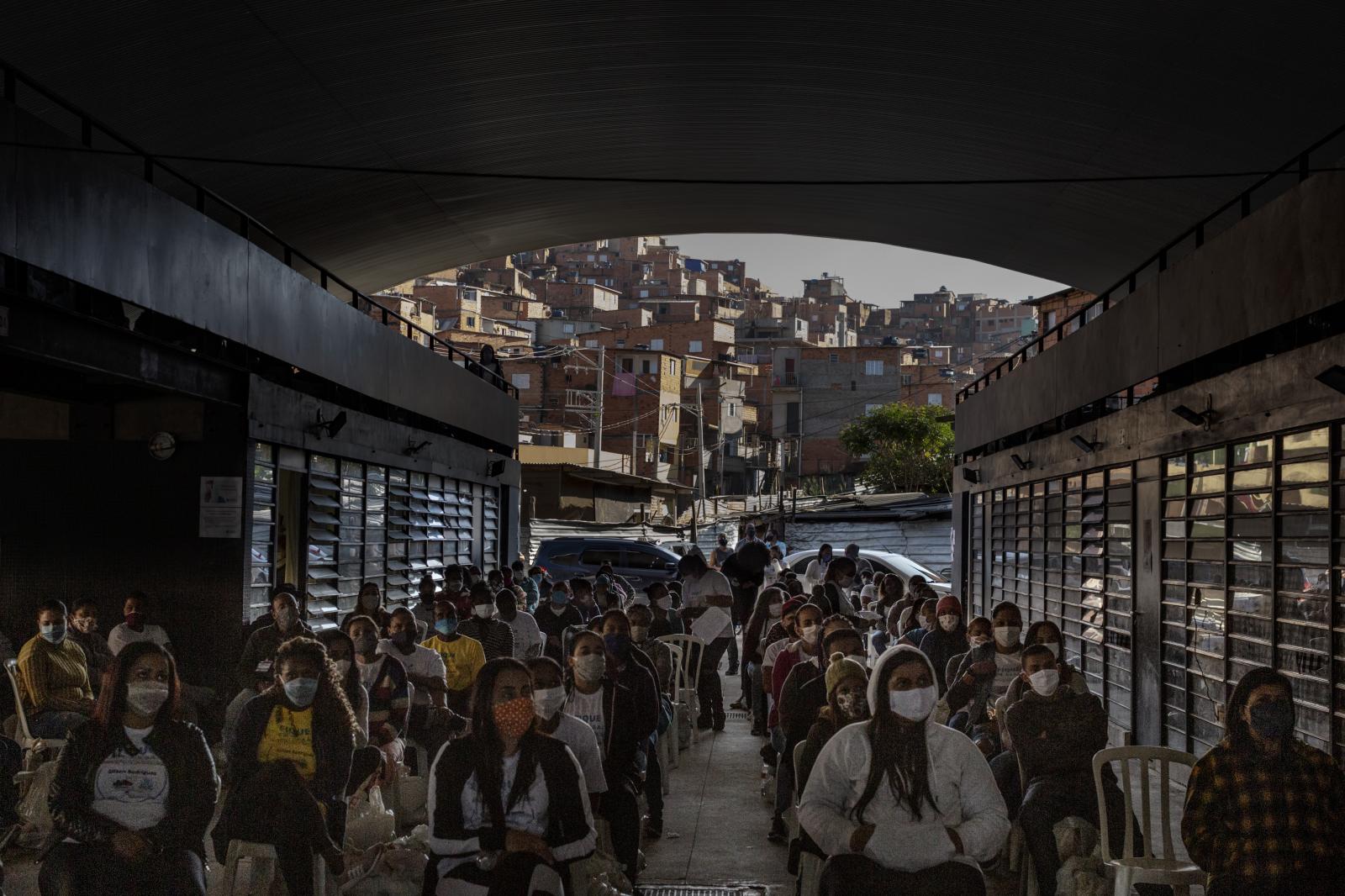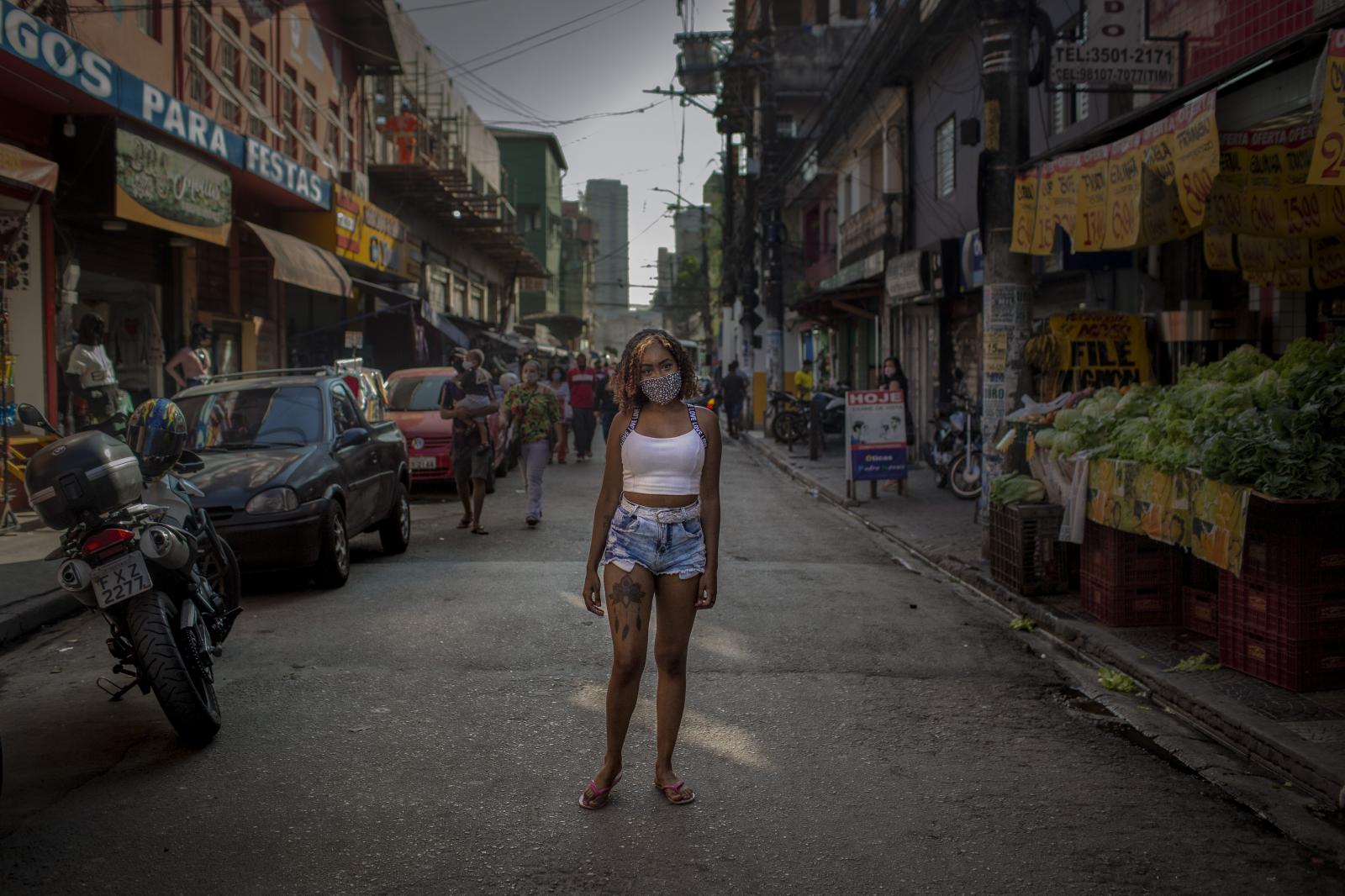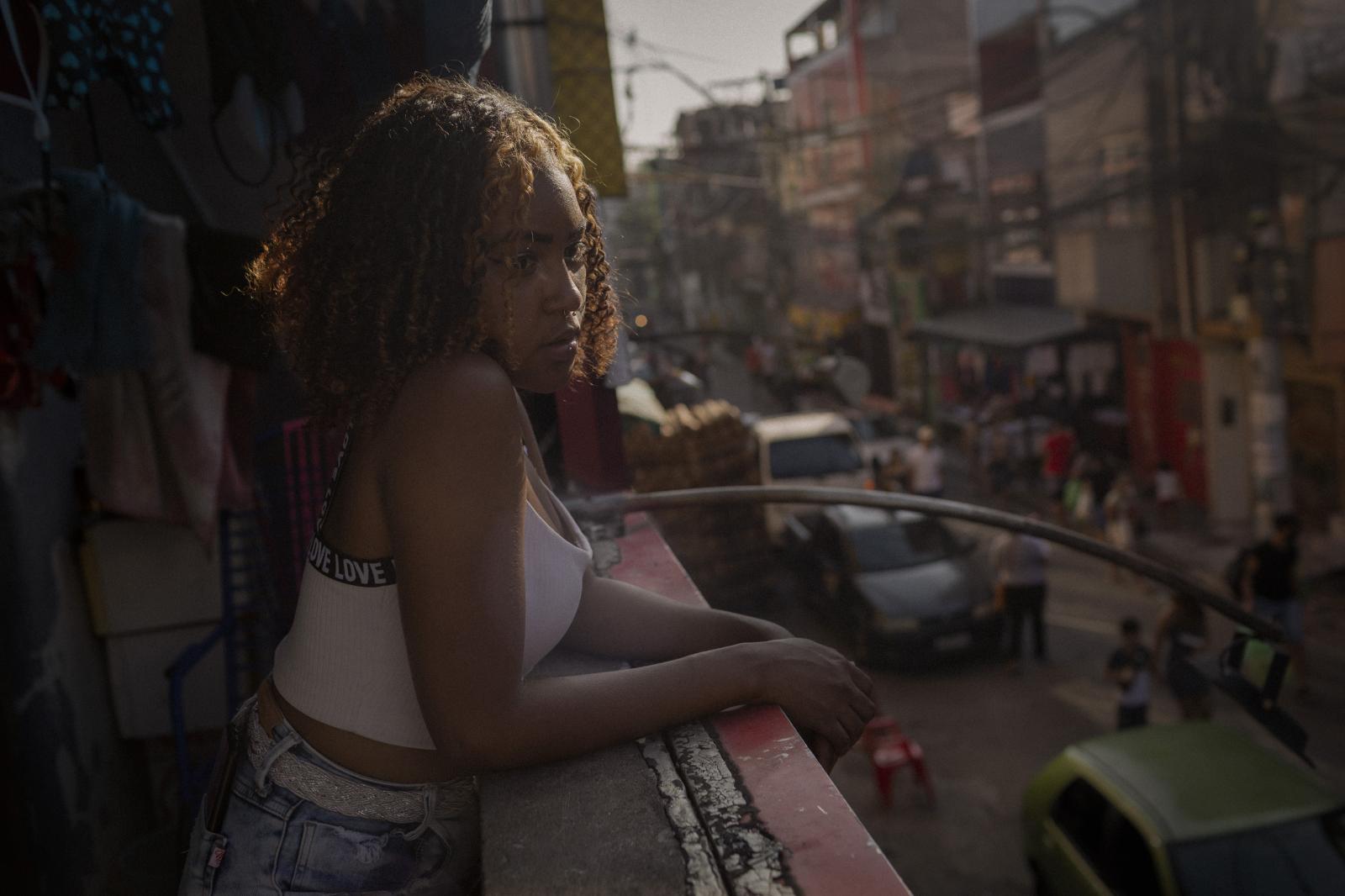
May 16, 2020.
Street presidents of Paraisópolis hold an assembly during the Coronavirus crisis. Paraisópolis is the second largest slum in São Paulo, with 75,000 inhabitants. Due to the lack of state assistance during the pandemic, residents organized to address the effects of the disease and take care of the most vulnerable: 655 street presidents were elected, and 90% of them were women according to data from the Paraisópolis Residents' Association. Among the functions of each president was to register the families on the street to distribute basic food baskets, cleaning kits, and reach out for medical assistance in case residents were infected with the disease. The Residents Association also hired ambulances and private doctors for Paraisópolis. Due to this popular organization, Paraisópolis had a better control of COVID-19 than the city of São Paulo according to the Pólis Institute, presenting on May 18, 2020 a mortality rate for the disease of 21.7 people per 100,000 inhabitants, below the municipal average mortality of 56.2.

Katielle Nunes de Araújo, a 19-year-old student was elected president of Melchior Giola Street in Paraisópolis. When the news about the virus came, she was unemployed, but she didn't want to remain idle. She became president of her street. Born in Bahia and raised in Fortaleza, she faced, at the age of 15, a three-day bus trip to relocate to São Paulo.. Since then she has lived in Paraisópolis with a friend. Katielle says she wasn't afraid - she wore a mask, used hand sanitizer and didn't enter the houses, she only went up to the door. "It's very nice when we help people, you see the happiness and gratitude on their faces. One day I gave my basic basket to a woman with five children, and she thanked me a lot because without it, the children wouldn't have anything to eat." Paraisópolis is the second largest slum in São Paulo, with 75,000 inhabitants. Due to the lack of state assistance during the pandemic, residents organized to address the effects of the disease and take care of the most vulnerable: 655 street presidents were elected, and 90% of them were women according to data from the Paraisópolis Residents' Association. Among the functions of each president was to register the families on the street to distribute basic food baskets, cleaning kits, and reach out for medical assistance in case residents were infected with the disease. The Residents Association also hired ambulances and private doctors for Paraisópolis. Due to this popular organization, Paraisópolis had a better control of COVID-19 than the city of São Paulo according to the Pólis Institute, presenting on May 18, 2020 a mortality rate for the disease of 21.7 people per 100,000 inhabitants, below the municipal average mortality of 56.2.

Katielle Nunes de Araújo on the balcony of her house in Paraisópolis, on Melchior Giola Street. "It's very bad to see that people's homes are missing food. We can't do everything by ourselves, we need someone from up there, but they don't listen to us. I think it's because we're from the favela". Paraisópolis is the second largest slum in São Paulo, with 75,000 inhabitants. Due to the lack of state assistance during the pandemic, residents organized to address the effects of the disease and take care of the most vulnerable: 655 street presidents were elected, and 90% of them were women according to data from the Paraisópolis Residents' Association. Among the functions of each president was to register the families on the street to distribute basic food baskets, cleaning kits, and reach out for medical assistance in case residents were infected with the disease. The Residents Association also hired ambulances and private doctors for Paraisópolis. Due to this popular organization, Paraisópolis had a better control of COVID-19 than the city of São Paulo according to the Pólis Institute, presenting on May 18, 2020 a mortality rate for the disease of 21.7 people per 100,000 inhabitants, below the municipal average mortality of 56.2.

Bruna Neves da Silva, 23 years old, unemployed and mother of 3 children, is the president of Viela Canita, in Paraisópolis. Paraisópolis is the second largest slum in São Paulo, with 75,000 inhabitants. Due to the lack of state assistance during the pandemic, residents organized to address the effects of the disease and take care of the most vulnerable: 655 street presidents were elected, and 90% of them were women according to data from the Paraisópolis Residents' Association. Among the functions of each president was to register the families on the street to distribute basic food baskets, cleaning kits, and reach out for medical assistance in case residents were infected with the disease. The Residents Association also hired ambulances and private doctors for Paraisópolis. Due to this popular organization, Paraisópolis had a better control of COVID-19 than the city of São Paulo according to the Pólis Institute, presenting on May 18, 2020 a mortality rate for the disease of 21.7 people per 100,000 inhabitants, below the municipal average mortality of 56.2.

Bruna Neves da Silva has 3 children and takes care of 2 more children from the neighbors in her one-room shack. In addition to the responsibilities of caring for and accompanying the families of Paraisópolis during the Coronavirus crisis, the street presidents still manage an intense personal life. Paraisópolis is the second largest slum in São Paulo, with 75,000 inhabitants. Due to the lack of state assistance during the pandemic, residents organized to address the effects of the disease and take care of the most vulnerable: 655 street presidents were elected, and 90% of them were women according to data from the Paraisópolis Residents' Association. Among the functions of each president was to register the families on the street to distribute basic food baskets, cleaning kits, and reach out for medical assistance in case residents were infected with the disease. The Residents Association also hired ambulances and private doctors for Paraisópolis. Due to this popular organization, Paraisópolis had a better control of COVID-19 than the city of São Paulo according to the Pólis Institute, presenting on May 18, 2020 a mortality rate for the disease of 21.7 people per 100,000 inhabitants, below the municipal average mortality of 56.2.

Claudia Amaral, 33, is the president of Gerônimo de Campos Freire Street, where she lives in a popular housing condominium. Paraisópolis is the second largest slum in São Paulo, with 75,000 inhabitants. Due to the lack of state assistance during the pandemic, residents organized to address the effects of the disease and take care of the most vulnerable: 655 street presidents were elected, and 90% of them were women according to data from the Paraisópolis Residents' Association. Among the functions of each president was to register the families on the street to distribute basic food baskets, cleaning kits, and reach out for medical assistance in case residents were infected with the disease. The Residents Association also hired ambulances and private doctors for Paraisópolis. Due to this popular organization, Paraisópolis had a better control of COVID-19 than the city of São Paulo according to the Pólis Institute, presenting on May 18, 2020 a mortality rate for the disease of 21.7 people per 100,000 inhabitants, below the municipal average mortality of 56.2.

Claudia Amaral takes care of her children in her popular apartment during the Coronavirus crisis in Paraisópolis. Amaral is married to another woman from the community and is an amateur soccer player. She conciliates the functions of president with the care of her 3 children, besides a stepchild. "We are doing the role that the president of Brazil should be doing: giving assistance to families in need". Photo taken in May 2020. Paraisópolis is the second largest slum in São Paulo, with 75,000 inhabitants. Due to the lack of state assistance during the pandemic, residents organized to address the effects of the disease and take care of the most vulnerable: 655 street presidents were elected, and 90% of them were women according to data from the Paraisópolis Residents' Association. Among the functions of each president was to register the families on the street to distribute basic food baskets, cleaning kits, and reach out for medical assistance in case residents were infected with the disease. The Residents Association also hired ambulances and private doctors for Paraisópolis. Due to this popular organization, Paraisópolis had a better control of COVID-19 than the city of São Paulo according to the Pólis Institute, presenting on May 18, 2020 a mortality rate for the disease of 21.7 people per 100,000 inhabitants, below the municipal average mortality of 56.2.

Maria dos Santos, 33, is president of Itajubaquara street in Paraisópolis. With the pandemic, Maria lost her jobs as cleaning assistant and hairdresser. Paraisópolis is the second largest slum in São Paulo, with 75,000 inhabitants. Due to the lack of state assistance during the pandemic, residents organized to address the effects of the disease and take care of the most vulnerable: 655 street presidents were elected, and 90% of them were women according to data from the Paraisópolis Residents' Association. Among the functions of each president was to register the families on the street to distribute basic food baskets, cleaning kits, and reach out for medical assistance in case residents were infected with the disease. The Residents Association also hired ambulances and private doctors for Paraisópolis. Due to this popular organization, Paraisópolis had a better control of COVID-19 than the city of São Paulo according to the Pólis Institute, presenting on May 18, 2020 a mortality rate for the disease of 21.7 people per 100,000 inhabitants, below the municipal average mortality of 56.2.

Maria dos Santos takes care of all household chores, including feeding and educating her two children who have their classes suspended during the pandemic and her husband who is unemployed. Paraisópolis is the second largest slum in São Paulo, with 75,000 inhabitants. Due to the lack of state assistance during the pandemic, residents organized to address the effects of the disease and take care of the most vulnerable: 655 street presidents were elected, and 90% of them were women according to data from the Paraisópolis Residents' Association. Among the functions of each president was to register the families on the street to distribute basic food baskets, cleaning kits, and reach out for medical assistance in case residents were infected with the disease. The Residents Association also hired ambulances and private doctors for Paraisópolis. Due to this popular organization, Paraisópolis had a better control of COVID-19 than the city of São Paulo according to the Pólis Institute, presenting on May 18, 2020 a mortality rate for the disease of 21.7 people per 100,000 inhabitants, below the municipal average mortality of 56.2.

The street presidents are also responsible for cooking more than a thousand marmitas a day to serve the unemployed or needy population of Paraisópolis during the Coronavirus crisis.

Renata Alves, cultural producer and director of the Women's Association of Paraisópolis, participates in the protest of the street presidents. With the crisis, Renata became part of the first aid work of the ambulances hired by the Association to serve the residents of the favela. "I was born in Paraisópolis and for knowing all the streets, alleys and alleys, to know my territory well, it was very important to have stayed with the ambulances. Now I know both sides of the health system. Favelado experiences the pandemic of racism, the pandemic of criminalization, the pandemic of lack of basic sanitation, the pandemic of prejudice, of thinking that he is not worthy. It's time to end it".

In a protest that had social distancing, the street presidents of Paraisópolis demand effective government policies against the coronavirus.
